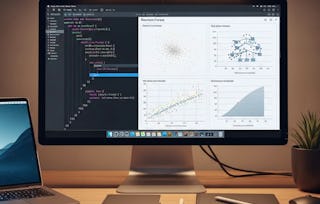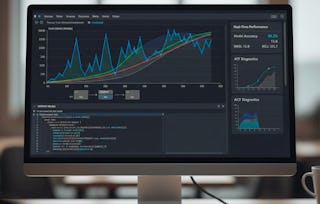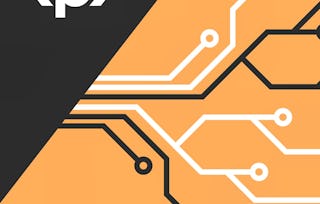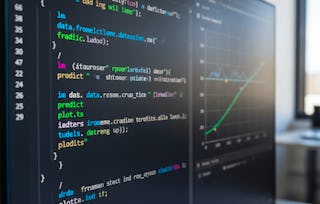By the end of this course, learners will be able to apply clustering algorithms, implement Naive Bayes classifiers, analyze text with supervised learning models, reduce dimensionality with PCA, and design foundational neural networks. They will also evaluate time series patterns, forecast using ARIMA and Prophet, optimize predictive performance with gradient boosting, and uncover associations through market basket analysis.

Advanced Machine Learning with R: Apply & Predict

Advanced Machine Learning with R: Apply & Predict
This course is part of AI Machine Learning with R & Python Projects Specialization

Instructor: EDUCBA
Included with
What you'll learn
Apply clustering, Naive Bayes, PCA, and neural networks in R.
Forecast time series with ARIMA, Prophet, and boosting methods.
Implement market basket analysis and optimize predictive models.
Skills you'll gain
- Machine Learning
- R Programming
- Time Series Analysis and Forecasting
- Model Evaluation
- Unsupervised Learning
- Applied Machine Learning
- Text Mining
- Predictive Modeling
- Feature Engineering
- Data Mining
- Artificial Neural Networks
- Dimensionality Reduction
- Classification Algorithms
- Exploratory Data Analysis
- Data Preprocessing
- Skills section collapsed. Showing 9 of 15 skills.
Details to know

Add to your LinkedIn profile
October 2025
16 assignments
See how employees at top companies are mastering in-demand skills

Build your subject-matter expertise
- Learn new concepts from industry experts
- Gain a foundational understanding of a subject or tool
- Develop job-relevant skills with hands-on projects
- Earn a shareable career certificate

There are 4 modules in this course
This module introduces unsupervised and probabilistic learning methods in R, focusing on clustering with K-Means and classification with Naive Bayes. Learners explore how to group unlabeled data into meaningful clusters and apply Bayes’ theorem to text and categorical data. Practical examples in R reinforce understanding of cluster visualization, probability computations, and classification accuracy.
What's included
12 videos3 assignments
This module explores advanced supervised learning techniques in R, including text mining with Naive Bayes and classification with Support Vector Machines. Learners analyze word frequency patterns, build document-term matrices, and develop spam detection models. They further master SVM concepts such as linear and nonlinear classification, the kernel trick, and RBF applications for optical character recognition (OCR).
What's included
9 videos3 assignments
This module focuses on techniques to simplify complex datasets and build predictive models with neural networks. Learners explore feature selection and extraction methods, apply Principal Component Analysis (PCA), and interpret eigenvalues and eigenvectors in R. The module concludes with neural network foundations, covering activation functions, topology, and weight adjustment for adaptive learning.
What's included
17 videos4 assignments
This module integrates advanced applications of machine learning in R, including time series forecasting, boosting methods, and market basket analysis. Learners develop forecasting models, apply ARIMA and Prophet for stock prediction, and implement gradient boosting to improve accuracy. The module concludes with association rule mining and an overview of emerging machine learning trends.
What's included
42 videos6 assignments
Earn a career certificate
Add this credential to your LinkedIn profile, resume, or CV. Share it on social media and in your performance review.
Explore more from Machine Learning
 Status: Free Trial
Status: Free Trial Status: Preview
Status: Preview
Why people choose Coursera for their career

Felipe M.

Jennifer J.

Larry W.

Chaitanya A.

Open new doors with Coursera Plus
Unlimited access to 10,000+ world-class courses, hands-on projects, and job-ready certificate programs - all included in your subscription
Advance your career with an online degree
Earn a degree from world-class universities - 100% online
Join over 3,400 global companies that choose Coursera for Business
Upskill your employees to excel in the digital economy
Frequently asked questions
To access the course materials, assignments and to earn a Certificate, you will need to purchase the Certificate experience when you enroll in a course. You can try a Free Trial instead, or apply for Financial Aid. The course may offer 'Full Course, No Certificate' instead. This option lets you see all course materials, submit required assessments, and get a final grade. This also means that you will not be able to purchase a Certificate experience.
When you enroll in the course, you get access to all of the courses in the Specialization, and you earn a certificate when you complete the work. Your electronic Certificate will be added to your Accomplishments page - from there, you can print your Certificate or add it to your LinkedIn profile.
Yes. In select learning programs, you can apply for financial aid or a scholarship if you can’t afford the enrollment fee. If fin aid or scholarship is available for your learning program selection, you’ll find a link to apply on the description page.
More questions
Financial aid available,



